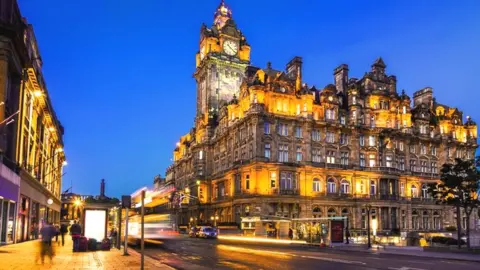Taxing times for Europe's tourists
 Getty Images
Getty ImagesEdinburgh councillors have hit the headlines by reviving plans to introduce a tourism tax for the city.
The local authority is drawing up proposals which could involve tourists paying a "transient visitor levy", otherwise known as an occupancy or bed tax, for hotel stays.
It argues a levy is needed to help the city cater for growing visitor numbers.
Edinburgh is not alone in pushing the idea, which has been raised elsewhere in the UK, including Hull and London.
But it has already taken hold in much of the European Union.
About two-thirds of member states currently impose occupancy taxes on visitors - the exceptions being Cyprus, Denmark, Estonia, Finland, Ireland, Latvia, Luxemburg, Sweden and the UK.
Typically, occupancy taxes are charged per person, per night, with significant municipal discretion over the rates applied.
The rate also typically varies by the standard of accommodation, location and local authority, and children often attract reduced rates or are exempt entirely.
 Getty Images
Getty ImagesTo make things even more complicated, only some areas of specific countries tax their visitors.
In Germany, for example, research by travel website Globehunters found that while Hamburg and Berlin charge tourists, there are no hotel taxes in Munich.
The formulas for applying the tax can also be complicated, with Brussels, for instance, basing it on the number of rooms in a hotel.
And then there's the question of the impact of taxes on tourism.
A report last year by business advisers PwC for the European Commission on EU tourism suggested that countries were likely to be affected "to different extents depending on the type of tourists they attract".
It said: "Academic literature suggests that tourists are highly responsive to a change in price of a beach holiday, given the extensive competition and the wide range of alternative options.
"Countries in Southern Europe, therefore, which rely on coastal tourism are expected to be most adversely affected by an increase in tourist taxes, and, by the same token also stand to gain the most from a reduction in tourist taxes.
"On the other hand, countries which are frequently visited by business travellers are likely to be less affected by changes in taxes upwards or downwards."
 Getty Images
Getty ImagesThe debate on the benefits or negative effects of a tourism tax is far from over in Scotland.
The Federation of Small Businesses (FSB) described Edinburgh's levy proposals as "unwanted" and "potentially damaging".
'Tax too far'
Garry Clark, from the FSB, said: "We have a higher rate of VAT in this country than many of our European competitors, we have very high levels of business rates in the city and throughout Scotland.
"Those are taxes that business is already paying and another tax would be a tax too far as far as our members are concerned."
But City of Edinburgh Council leader Adam McVey argued that a tax is needed.
He said: "The number of people coming to Edinburgh is growing consistently year on year.
"This is a fantastic thing for our city, it makes us a vibrant, exciting place to come and visit.
"But it also creates some challenges, some pressure on local services and also on things like the festivals that we need to keep on growing to expand that offer."
 Getty Images
Getty ImagesEdinburgh has long advocated a levy for the capital, where visitors are estimated to spend nearly £1.5bn a year, supporting about 34,800 jobs.
As far back as 2011, councillors agreed in principle to a tourism tax plan, estimating then that it could raise up to £10m a year by charging between £1 and £2 per room each night.
The council's new plans are expected to be revealed this summer, followed by a consultation with local businesses.
But that could mean the end of the line for the proposals, because Edinburgh - as with all local authorities - does not have the power to introduce a tourist tax. Establishing such a power would require an act of the Scottish Parliament.
The Scottish government has remained lukewarm over the idea of taxing visitors.
A government spokesman said: "We have no plans to introduce a visitor levy on the tourism sector, which is already subject to the second highest VAT rates in Europe by the UK government.
"We continue to deliver a fair deal to councils across Scotland, with revenue and capital funding increasing in real terms over the next financial year."